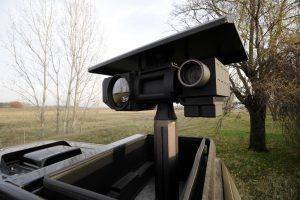
A “smart wall” that combines sensors, radars and surveillance technologies will be the key to securing the nation’s borders, U.S. Rep. Will Hurd (R-TX) recently noted, not a “third century” solution like a physical barrier.
Hurd, a former CIA agent, wrote in an Aug. 7 op-ed appearing in USA Today that while a physical barrier can be effective in certain urban areas, the nation’s southern border presents geographical, cultural and technological challenges that require flexibility and “a sector-by-sector approach.”
“The federal government should have secured our borders by now,” Hurd wrote. “The tools to do so are available and have existed for some time in the private sector. I used many of them when I worked for a private intelligence firm after nearly a decade of service in the CIA,” said Hurd, who serves on the House committees on both Homeland Security and Intelligence.
Although sensor technology can detect the difference between a jack rabbit and a human moving across the desert and drones can track people anywhere on the planet, Hurd wrote, “We’ve allowed an outdated, physical barrier to dominate the national dialogue and stifle innovation.”
“What we need is a ‘smart wall’ to solve our 21st century border problems,” Hurd continued. “A smart wall would use sensor, radar and surveillance technologies to detect and track incursions across our border so we can deploy efficiently our most important resource, the men and women of Border Patrol, to perform the most difficult task — interdiction.”
Most of that process can be conducted through the use of artificial intelligence and machine-learning, he said, allowing Border Patrol agents to focus on stopping individuals and contraband from illegally crossing the border.
The Trump administration’s budget proposal estimates that each mile of a physical barrier would cost $24.5 million. However, using off-the-shelf technology to build a smart wall would bring costs down to approximately $500,000 per mile, Hurd wrote.
“Based on these figures, we’d save more than $32 billion that could be used to pay down our national debt, hire more Border Patrol agents, or increase CIA and NSA operations pursuing criminal organizations in Mexico and Central America,” Hurd said.
Hurd introduced the Secure Miles with All Resources and Technology (SMART) Act in July with a goal of ensuring that an effective and fiscally responsible strategy is adopted to achieve greater control of the southern border. Under the bill, the Department of Homeland Security would be required to deploy the most practical and effective border security technologies available. “And before constructing expensive physical barriers, the DHS secretary would have to justify the expense to Congress,” Hurd said.
Hurd concluded that years and tens of billions of dollars can be spent on an “outdated solution” and fighting eminent domain lawsuits, or smart wall technology could be used to shore up national security faster, more efficiently and more cost-effectively.



